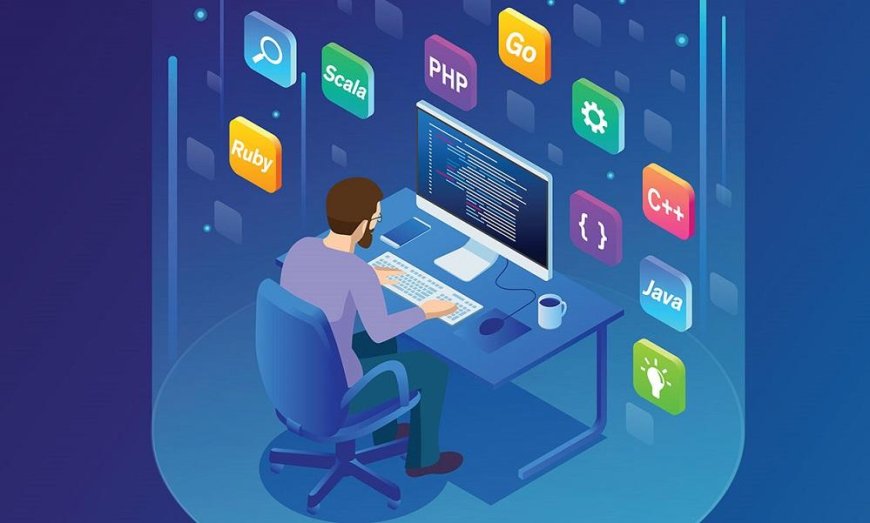Programming to build a new world
there; However, in that virtual life everything has a raw material that has served to build the unimaginable, programming to build

There are things that we take for granted and see normal within the digital world, because it seems that all that exists for the mere fact of being there; However, in that virtual life everything has a raw material that has served to build the unimaginable, programming to build a new world.
The most exact simile is our real world, where all existing matter is composed of atoms, indivisible particles from whose union molecules are formed, and these, in turn, form cells (in the case of living beings), from which every organism arises, from a unicellular bacterium to the human being himself.
The same thing happens in the digital world; its minimum unit is bits (binary code of 1 and 0), which are in turn grouped into bytes, megabytes, etc., and which are the raw material for everything we find in the digital world: images, multimedia, texts, as well as the functions for this information to be dynamic.
Perhaps we are aware of how the digital world and its representation in virtuality is changing our lives, how our way of working, studying, trading, transporting or eating has changed, even how it has modified areas ranging from the cultural to the economic and from the political to the social, health, the way we relate to others or our own way of seeing the world.
What we are often not aware of is that this new world is less than 50 years old and has developed, exponentially, thanks to the way we were able to communicate with machines. They have helped us to store, manage and create every corner of this digital world.
Must Read: Restlessness, disrupted teaching, inattentiveness “ is that necessary?
But it is also necessary to emphasize that everything arose through human ingenuity and creativity. Everything that is used in a computer was created by a human being, and thus we are building a new world thanks to programming.
To build, communicate and be present in this digital world, the formation of logical languages ‹‹has been necessary. They determine a predictable series of events and / or conditional facts through a formula known as an algorithm. There may be many of them to solve the same problem, the challenge is to find the most efficient and simple.
The machines follow the instructions that we generate and that simple fact entails a great ethical and moral responsibility, to say the least, because due to errors, omissions or simply for not considering all the variables of an environment and the real needs of the users, many times its implications have affected, voluntarily or involuntarily, the lives of many people.
These instructions affect, among many important things, the use of pacemakers, geolocation services and emergency networks, genetic and biochemical research, medical implants, resource sustainability, media reliability, environmental protection, and public administration.
Hence the fundamental importance acquired by the use and development of the system of instructions and logic that machines will follow: their programming code, that is, the building blocks of the virtual world.
It is surprising that all this responsibility and work falls only on approximately 0.3% of the world's population, people who know how to use programming languages ‹‹and are writing and laying the guidelines and the foundations of how things work in the immense digital world.
Therefore, it is imperative to expand the sector of those who are programming and writing code, so that the experience of a more plural professional is included in their teaching, who, in addition to technical skills, can be perceptive and recognize the correct descriptions to solve particular problems of a population segment, a region, culture or idiosyncrasies.
To this end, from the first years of training, teaching programming as a language is as important as teaching one's own language or a second language. This knowledge opens up the possibilities of more assertive communication, in this case, to build solutions to specific needs, as well as to learn to think about solving problems with all their edges and variables.
Every day this approach to programming becomes more urgent, especially with a view to the next level of digital development, which is giving way to the use of Artificial Intelligence (AI), a total form of abstraction where the computer itself learns to make decisions. , is no longer limited only to following instructions (automated learning algorithms), but to creating a new œintelligent and artificial space where the machine begins to create its own instructions.
We are building a new world with increasingly intuitive tools that more and more people use. To help make this new world better, it is important to start involving more students in its construction, starting with the teaching of programming languages ‹‹and understanding above all that their uses and implications, positive or negative, go beyond what technical and require social skills such as creativity, assertiveness, inclusion, ethics or sustainability, to name a few.
As more students, and especially educational systems, become involved in the development and use of programming code from an early age and with a social focus, we will be able to see the birth of a generation that can become an important factor. Change in direction, not only in the digital world, but also in the analog world, as well as its repercussions in all areas of human endeavor.
